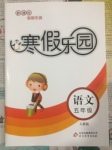题目内容
Taking medicine only gives you _______ relief from pain, so I suggest you have an operation.
| A.flexible | B.optional | C.temporary | D.beneficial |
C
解析

 寒假乐园北京教育出版社系列答案
寒假乐园北京教育出版社系列答案
One very cold day,a snowstorm blew into our area. Needing firewood,I quickly set out with my best friend,Bruce,to look for a tree to cut down. I was glad to have Bruce along with. Cutting down a tree in a snowstorm can be dangerous. So it was important to have a friend who could warn me of danger.
When I chose a big tree about 23 meters tall and prepared to cut it down,my best friend suddenly warned me,“Don’t cut down that tree!It’s too close to the power line!﹙电线﹚”I wasn’t sure about it. So I decided to disregard his warning. I wanted to finish the job quickly and go home. So I began cutting down the tree. When the tree fell,there was no longer any doubt that my friend was right.
The tree caught the power line,bringing it to the ground. I considered cutting the tree off the line. After all,electricity can’t travel through wood,so I could safely remove the tree. As I reached out my finger to touch the tree,pain ran up my arm and through my head. I was shocked!
After I returned home and told my mother what had happened,she quickly called the power company. The workers from the power company soon arrived on the scene. One of them asked if I had touched the tree,and when I told him I had,his face turned pale.
“You should have been killed,” he said.
So why am I still alive?It was my boots that saved my life.
Within two hours,the workers removed the tree. Soon the snowstorm calmed down—but not my mother.
Even though she was glad I wasn’t hurt,my mother was still serious. After all,I shouldn’t have brushed off my friend’s warning.
Through this experience,I learn it’s important to listen to people who offer a different perspective. Taking time to listen might actually save a lot of time and trouble. It certainly would have kept me from getting the “shock” of my life.
【小题1】The underlined word “disregard” in the second paragraph means “________”.
| A.pay no attention to | B.take notice of | C.consider | D.follow |
| A.But for his boots,the author would have died. |
| B.The author regretted having brushed off his friend’s warning. |
| C.The author knew nothing about electricity. |
| D.When the tree was cut down,the author realized his friend was right. |
| A.my mother was still angry with me for not listening to my friend’s warning |
| B.my mother was still in fear of the terrible accident |
| C.my mother was still comforting me |
| D.my mother was still worried about my safety |
| A.give an account of one of his terrible experiences |
| B.make us know it’s important to listen to people who offer a different perspective through his experience |
| C.tell us not to cut trees down any more |
| D.remind us to be careful while we are working |
—How did you find the fashion show?
—_______________.
| A.A friend of mine showed me the way | B.It was fascinating |
| C.The designer invited me | D.By taking a No.11 bus |